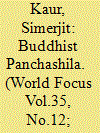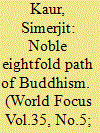|
|
|
Sort Order |
|
|
|
Items / Page
|
|
|
|
|
|
|
| Srl | Item |
| 1 |
ID:
130031


|
|
|
|
|
| Publication |
2014.
|
| Summary/Abstract |
Woman and man have been complimentary to each other in the case of creation of a new entity in general and in continuity of the world in particular. But, ever since the dawn of human civilization, the history shows that women have been treated in almost all the societies of the world as a second-rated citizen despite the fact they constitute numerically half of the entire human population. In the past when Siddh?rtha Gautama, the Buddha and Gandhiji were dwelling on this planet, the condition of the women was not better than to-day. They were decorative pieces, object of sensual gratifications of male, and almost confined to the household work. Moreover, they were deprived of education, one of the basic necessities of mental development. In such a situation, the views expressed by the Buddha and Gandhiji could be a mirror to evaluate the place of women in the society.
|
|
|
|
|
|
|
|
|
|
|
|
|
|
|
|
| 2 |
ID:
130166


|
|
|
|
|
| Publication |
2014.
|
| Summary/Abstract |
Ever since the dawn of civilization the human beings have the tendency to live in a group, called society, which is generally made up of the people carrying diverse and divergent views and outlooks relating to different aspects of life. To maintain balance in the atmosphere of diverse views and outlooks of the people society requires some sorts of balancing force akin to lever, which plays an important role in maintaining the balance between two forces, weights, etc of a machine or instrument. Buddhism keeping in view the different aspects of human life, prescribed different modes of path or way of life to establish peaceful and equanimous society. Pañcas?la is one of them, the practice of which is important for the smooth functioning of life and also to have social equilibrium.
|
|
|
|
|
|
|
|
|
|
|
|
|
|
|
|
| 3 |
ID:
130820


|
|
|
|
|
| Publication |
2014.
|
| Summary/Abstract |
When the society was on turmoil and the individual was in a state of fix on account of the prevalence of numerous views with regard to the different aspects of life, Gautarna, the Buddha made the world aware of an ethical means to get rid of suffering and the attainment of Eternal bliss. Buddhism originated in 6"' century B.C.E.' beneath the Bodhi-tree was disseminated by Siddehartha Gautam, the Buddha and his contemporary disciples in the different nook and comer of Ancient India 'for the good of the many, for the happiness of the many, out of compassion for the world". Later, the Indian merchants trading in the foreign lands, and the missionaries dispatched by the Mauryan King Asoka carried and introduced it beyond the frontier of ancient India, the land of its origin. It originated in the backdrop of spiritual unrest and intellectual ferment in the country. During that period the Brahmajalasutta records the prevalence of sixty-two views' related to the difference aspects of human existence while the Samafi?aphalasutta enumerates the views of six heretical thinkers - Pakkuddha Kaccana, Makkhali Gocala, Ajita Kesakambli, Purana Kassapa, Niganmha Namaputta, and Safijaya Velammhiputta', who were cotemporary to the Buddha. These views were, though conflicting in themselves, deeply rooted in the psyche of the people. Contradictions existing "in these views were perplexing the people and complicating their life. In no way these views were providing any comfort, peace and happiness to them. Rather, a natural question crept in their mind as to which of them was true, and how could one attain the eternal bliss?
|
|
|
|
|
|
|
|
|
|
|
|
|
|
|
|
|
|
|
|
|